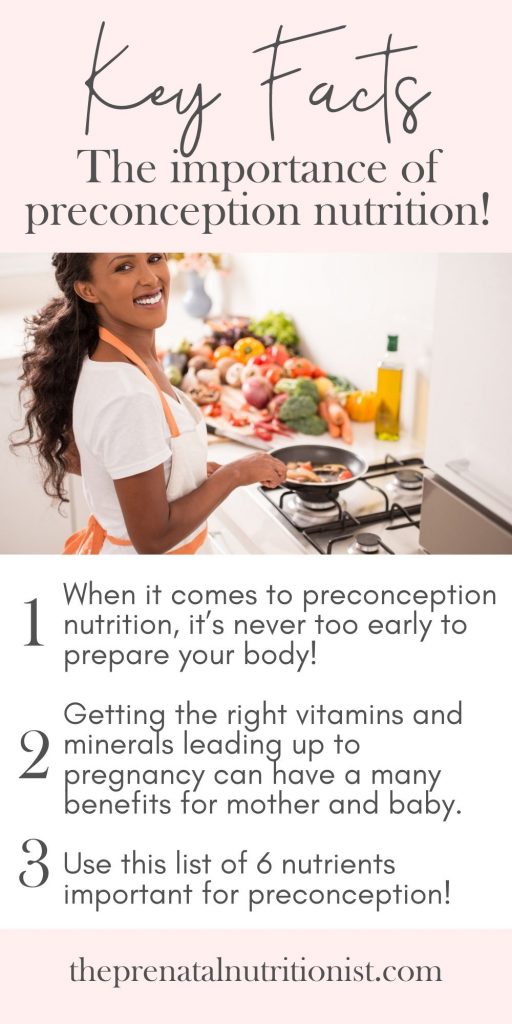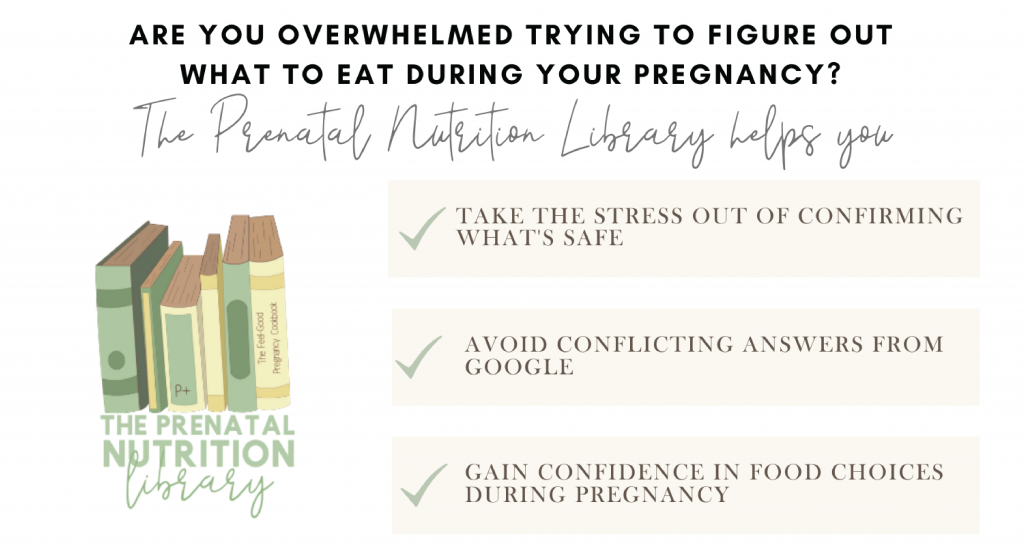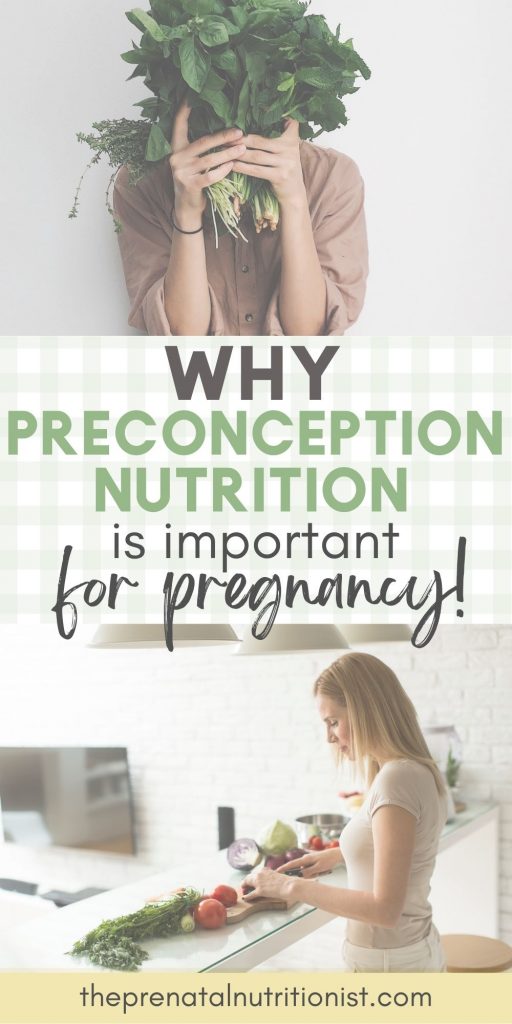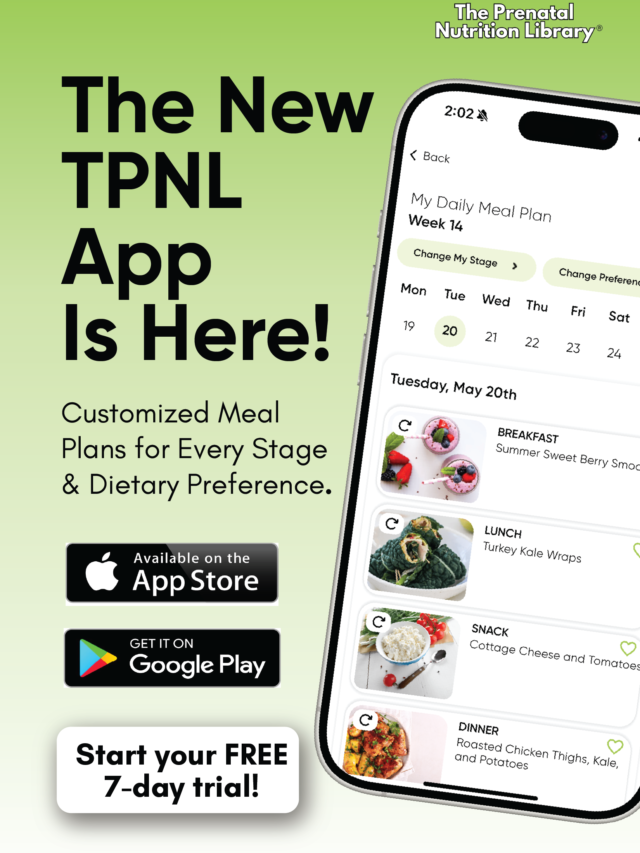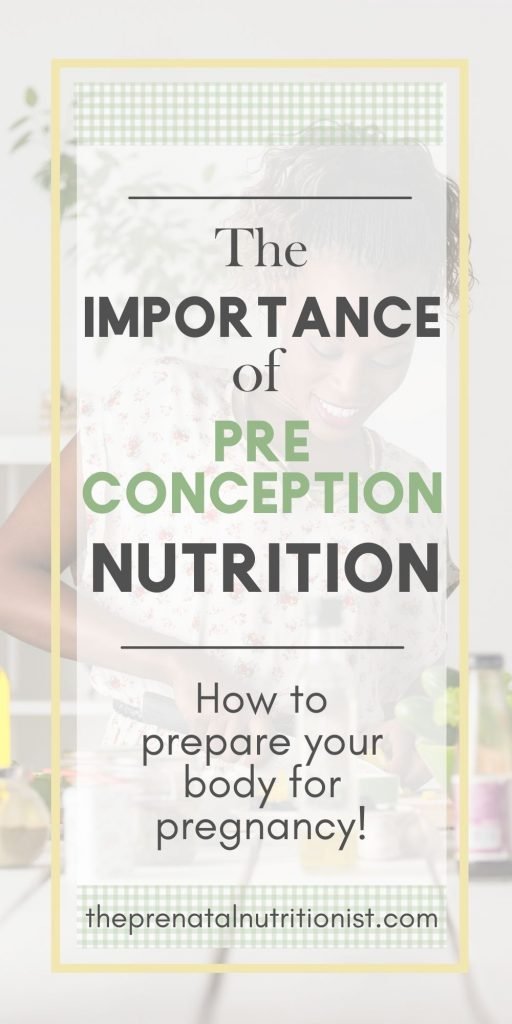
Preconception nutrition is a term used to describe nutrition in the weeks, months, or even years leading up to pregnancy or between pregnancies. In recent years, there have been a variety of studies about the importance of preconception nutrition when it comes to fertility, proper growth and development of the fetus, and the overall health of mother and baby.
We know from the latest and ongoing research that preconception nutrition is absolutely vital when preparing for a happy and healthy pregnancy!
Importance Of Preconception Nutrition
Making sure you are consuming a nutrient-dense diet leading up to pregnancy can have a multitude of benefits for mother and baby during pregnancy! Nutrition also plays a role in fertility factors for both partners, including egg quality and sperm health. In a study published in Developmental Biology, the nutrient deficiency was linked to compromised fertility.
Proper nutrition plays a key role in fertility for men. Consuming foods with essential preconception vitamins and minerals can increase sperm counts and improve sperm motility.
A nutrient-dense diet and optimizing nutrition in the preconception time could play a key role in reducing the risk of common pregnancy complications like gestational diabetes and high blood pressure. Practicing a nutritious diet before pregnancy can also help maintain healthy weight gain during pregnancy and better prepare the body for the plethora of changes that come along with pregnancy.
And, lastly, if first-trimester nausea and “morning sickness” hit hard during pregnancy proper nutrition in the preconception period could help to supply your body and baby with plenty of nutrient stores to pull from.
So, let’s go over some of the most important preconception vitamins and minerals!
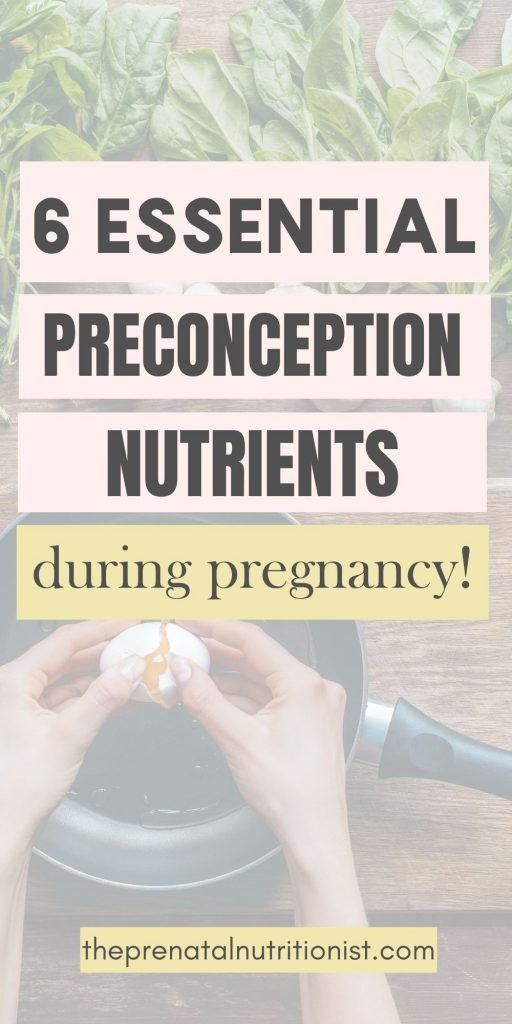
Essential Preconception Vitamins, Minerals, and Nutrients
Iron
Iron is an essential mineral that your body needs to complete its day-to-day functions. During pregnancy, iron is crucial for the proper growth and development of baby. It’s also needed for the function of your placenta. Iron is a major component of hemoglobin. Hemoglobin transports oxygen all throughout the body.
Iron deficiency is the most common nutrient deficiency worldwide. Blood supply increases by about 50% during pregnancy to transport nutrients and oxygen to baby and to tissues throughout your body. This is why women require almost twice the amount of iron during pregnancy. Iron deficiency anemia is not uncommon during pregnancy.
While it is very treatable, it is a dangerous condition during pregnancy that can have serious side effects, such as preterm birth and low birth weight. Getting enough iron during the preconception period can help to prevent iron deficiency and anemia once you enter pregnancy.
How much to consume: 27 mg/day (RDA for pregnancy)
Sources of iron:
- Red meat
- Beef and chicken liver
- Cooked shellfish
- Lentils
- Pumpkin seeds
Folate
Folate, also known as vitamin B9, is needed for a plethora of processes in the body before and during pregnancy. It plays a key role in the production of our body’s genetic material, DNA and RNA, vitamin metabolism, and amino acid creation. Folate is also used by the body to help form the baby’s brain and spinal cord and is most “well-known” for its role in the prevention of neural tube defects. Folate also works with vitamin B12 and iron. A deficiency of folate can lead to a type of anemia called megaloblastic anemia.
How much to consume: 600 mcg DFE/day (RDA for pregnancy)
Sources of folate:
- Lentils
- Eggs
- Leafy greens (Try one of these Green Smoothies!)
- Citrus fruits
- Nuts and seeds
Vitamin D
Research shows that vitamin D plays a key role in fertility. Some conditions, such as endometriosis and polycystic ovary syndrome (PCOS), have been linked to vitamin D deficiency. The best source of vitamin D is sunshine. It is not found in many food sources. Deficiency during pregnancy has been linked to many negative outcomes. Some of these include gestational diabetes and preterm delivery.
The preconception period is a great time to optimize vitamin D levels and correct deficiencies. It’s ideal to get lab work done to see if you need more than the RDA (tip: most people do!).
How much to consume: 600 IU/day (RDA for pregnancy)
Sources of Vitamin D:
- Sunshine
- Salmon
- Egg yolk
- Mushrooms (if grown in sunlight)
- Sardines
- Vitamin D3 supplements
DHA
DHA, or docosahexaenoic acid, is essential before and during pregnancy. It is a key component of cell membranes and is also found in the brain. It is one of the most important building blocks of the eyes and skin and plays a key role in the development of the baby’s brain. The placenta transfers nutrients, including DHA from the mother to baby during pregnancy, so it is essential to consume DHA, ideally from the sources below.
How much to consume: at a minimum 300 mg/day
Sources of DHA:
- Salmon
- Tuna
- Omega-3 enriched eggs
- Anchovies
- Shellfish
Calcium
Calcium plays a key role in health from preconception to delivery and beyond! Starting to consume plenty of calcium during the preconception period is key. Consuming calcium helps promote strong and healthy bones, helps you move your muscles, and is important for blood circulation.
Calcium is also linked to the proper growth and development of the baby’s bones, teeth, heart, and nerves. Plus, adequate consumption may play a role in the prevention of preeclampsia and high blood pressure during pregnancy.
How much to consume: 1,000 mg/day (RDA for pregnancy)
Sources of calcium:
- Milk
- Cheese
- Greek yogurt
- Chia seeds
- Almonds
Choline
Choline is an essential nutrient. Most people are not meeting the daily recommendations for choline. It is needed for all our cells to function. Choline also plays a role in regulating mood and memory. When it comes to preconception and pregnancy nutrition, choline is especially important. Like folate, it helps in the prevention of neural tube defects. Choline is also important for brain development, including the memory portion of the brain.
How much to consume: 450 mg/day (RDA for pregnancy)
Sources of Choline:
- Beef
- Chicken
- Salmon
- Brussel sprouts
- Eggs
Focusing on your preconception nutrition now will have a multitude of benefits later!
In addition to the benefits of consuming the essential nutrients listed above, there are also many benefits of taking a prenatal vitamin before pregnancy! When it comes to preconception nutrition, it’s never too early to prepare the body for the many changes that come along with growing a tiny human.
If you’ve just started your fertility journey, be sure to check out these Mediterranean diet recipes that promote fertility. And if you’re in the first trimester, you’re going to love my top 10 drinks for early pregnancy! If you are looking for a step-by-step guide, join The Prenatal Nutrition Library as an annual member and follow our preconception meal plan. You will also find preconception nutrition information for your partner inside The Prenatal Nutrition Library!
